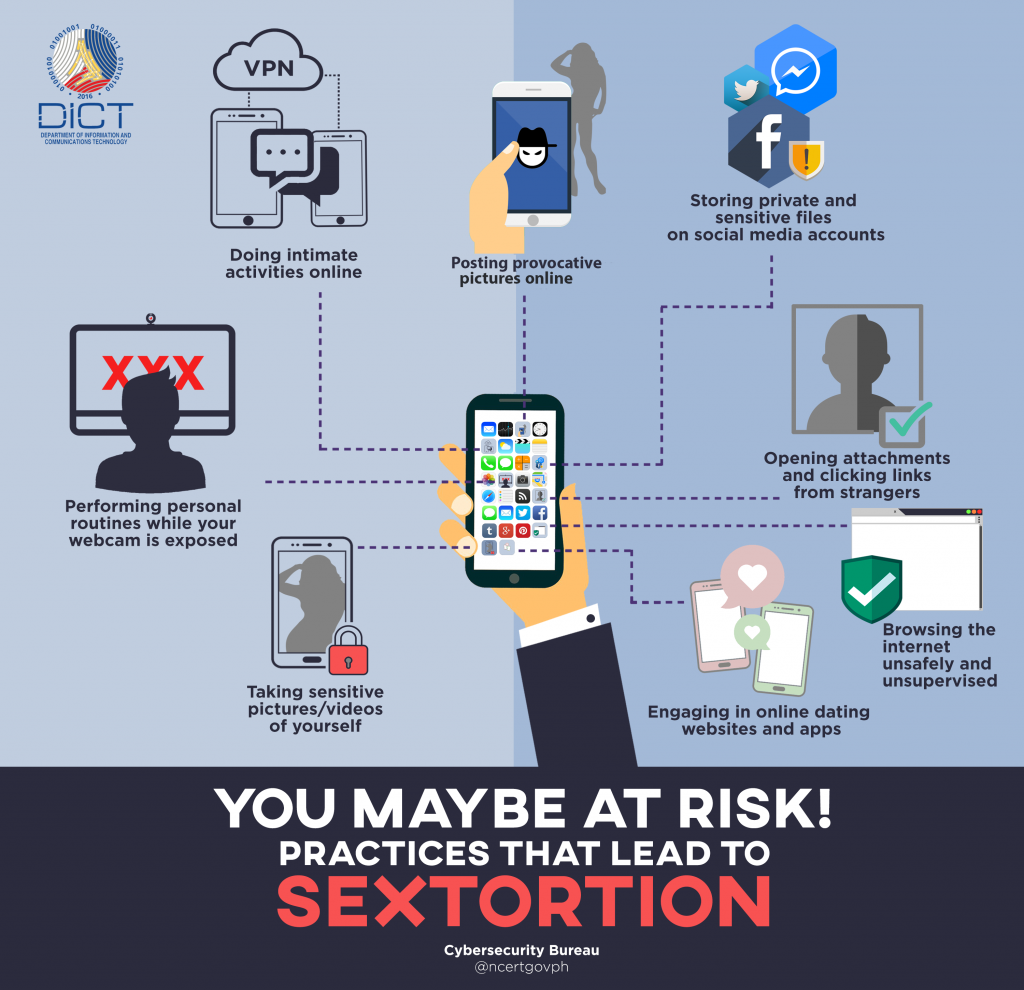When you post or send anything online, expect that someone has seen it and might even save it for his perusal. Nowadays, people’s idea of documenting themselves is evolving and the idea of recording your daily life thru social media has become a habit. It comes to the point that others become comfortable of sharing even their nude photos online. But what if you are already in the verge of experiencing sextortion?
Sextortion happens when someone threatens that they’ll expose your private and sensitive files if you do not provide them what they want. These extortionists commonly demand for money and more sexual, private and sensitive pictures and videos.
Hackers and perpetrators who involve themselves in the spread of nude materials usually hide behind fake accounts and spoofed IP addresses, which makes them harder to trace. But with the movement and support of the government, cybercriminals are identified, arrested and punished for their illegal deeds. Offenders who commit this kind of crime face charges under the Philippine Law thru the Cybercrime Prevention Act, Anti-Photo and Video Voyeurism Act; and Anti-Child Pornography Act, if the victim is a minor.
One reason this cybercrime is prevalent is the lack of awareness on the implications of the technologies we use. Any sensitive file, conversation, picture, videos and other private documents can easily spread and can be used as leverage for sextortion and blackmail. Most of the time, victims find themselves in a situation where it’s too late to prevent the distribution or at least mitigate it.
Here are common practices that can lead to being a victim of sextortion and blackmail:

- Taking sensitive pictures/videos of yourself
One failproof tip is to never record or shoot sexy and nude photos of yourself. You never know who can access your phone or computer. They can save your files and spread them online. Always think of the consequences and aftermath before taking a picture of yourself naked. Remember that prevention is always better than cure.
- Performing personal routines while your webcam is exposed
Hackers and exploiters can access your webcams without your knowledge. If possible, cover your webcam with tape when you are not using them. Also, a lot of social media applications require camera access. Be vigilant in allowing camera access to your apps. Some apps ask permission to use your camera when the app has no photography/capturing feature.
- Doing intimate activities online
Missing your partner is a reality when you are far away from each other. Chances are you unknowingly involve yourself in an intimate session with your partner which is being recorded by cybercriminals. In the case you engage in this, make sure that you are communicating via a secure VPN(Virtual Private Network) to immensely decrease the risk of someone recording your session.
- Posting provocative pictures online
Since social media is a staple of our daily lives, we tend to post many pictures, video and stories in social media. Technology today also allows editing of pictures and videos, resulting to fake nudes, making it seem like you have nudes of yourself. Cybercriminals can use this as leverage for blackmail.
- Storing private and sensitive files on social media accounts
Social media is not meant for storing files especially those that are sensitive. It may be easier to obtain and read your files online, but we must be aware that there is a high risk that hackers can access these files. Logging in your social media accounts anywhere can also put you in danger. If you forget to log out your account, the next user of the device can access your social media accounts, view your conversations, save your pictures and videos, and can be used for blackmail.
- Opening attachments and clicking links from strangers
Malware and viruses are usually delivered using files that look harmless. They are often hidden as word and pdf files. When the file is opened, malware is executed and this can be a vector for cybercriminals to access your camera and files. Always be careful of the links and files you open especially from people you do not trust. Learn to spot a phishing link/messages.
- Engaging in online dating websites and apps
Just when you thought you are chatting with someone who is looking for love like you do, he/she might actually looking for a way to scam you. Online dating apps are now becoming the feeding ground of sextortionists to look for their next victim. They interact and build rapport until such time that they will start sending racy photos then persuades the victim to do the same. Oftentimes, a sextortionist pretends to be a woman and targets men in these online dating websites and apps.
- Browsing the internet unsafely and unsupervised
Sextortionists can easily find leverage when we access websites that are unsafe. Many unsafe websites have malware in them. Children are most vulnerable since they do not have further knowledge about Internet safety. There should be an adult looking after them when using a computing device or if they use your device, make sure that parental controls and restrictions are enabled.
